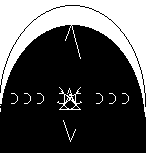
![]() : {
: {![]() {
{![]() (related)
(related)![]() (water)
(water)![]() (air)} (amphibian)(両生類).
(air)} (amphibian)(両生類). ![]() ( up: because of their jumping )}: frog(蛙) : the symbols of 'amphibian'
and 'frog' are also picture like fundamental characters(基礎的な象形文字)
( up: because of their jumping )}: frog(蛙) : the symbols of 'amphibian'
and 'frog' are also picture like fundamental characters(基礎的な象形文字)
![]() : {
: {![]() (above)
(above) ![]() (nature)}:
heaven (天)
(nature)}:
heaven (天)
![]() : {
: {![]() (below)
(below) ![]() (nature)}: under
ground (地下)
(nature)}: under
ground (地下)
![]() : time(時)
... A frog has a lot of time,
: time(時)
... A frog has a lot of time,
but no ![]() (past) and
(past) and ![]() (future). (蛙には永い時間はあっても過去や未来はありません)
(future). (蛙には永い時間はあっても過去や未来はありません)
After a long time in this corner, I'd like to remind you the phonetic
usage of EL. EL can show not only meanings but also ways how to pronounce.
For that, I introduce a part of a poem by Kusano Shinpei ( 1903-1988
famous by poems related to 'frog' ). The poem 'monologue of Gobiraff'
in his "The Standard Text of Frog"( 1948 ) was written by a unique
language of a frog, and Kusano added its Japanese translation.
Here for the convenience to compare the three writing ways, the
layout I used as the following sequence for each line of the poem:
1) original sounds by Japanese KanaThe sound parts in EL are held by phonetic brackets
2) that description by EL phonetics
3) that Alphabetic description (translated into an American frog dialect)
4) that meaning in Japanese translated by the author
5) that EL translation
6) that English translation.
Japanese doesn't distinguish [ l ] and [ r ]; sometimes pronounces with curled tongue; other time with almost [ l ] tongue: whichever tip touching to the hard palate usually. I tried to use both ways in EL; The EL expression followed the original sounds, but its English version is a little arranged for American's natural tongue.
As you see, EL is not convenient for writing sounds of
any traditional lamguage; convenient for sending meanings directly. But EL
phonetic bases for vowels and consonants are simplified shapes of the main
organ to pronounce a sound, so you can memorize easily, and by conbinations
of only 48 bases, you can write any human mouth sounds. Please enjoy to express
strange voices for your fun, or use the knowledge to learn a foreign language,
referring to the phonetic system
site . Each basis has a frame, but compounded symbols have not.
Hope you'll enjoy my EL pictographic illustration above too.
久しぶりに今月は地球語表音記号を使ってみましょう。草野心平の詩集『定本蛙』から「ごびらっふの独白」
の一部をつづります。オリジナルはかな表記の蛙語とその和訳です。
1行ずつ、蛙語の原文、地球語の表音、英語読み、心平の日本語訳、その地球語訳、英訳の順に並べています。地球語では、 ![]()
![]() 内は表音文字、
内は表音文字、 ![]()
![]() 内は表意文字であることを示して記号を使い分けます。これで括るため、行末のピリオドは省きました。ら行の発音を、地球語では硬口蓋に触れる舌先の舌が巻いてるか、平らかの2通りを表記しました。「ん」も場合によって発音の仕方がちがう通りに表記しています。英語では、ローマ字だとうまく読んでもらえないので、アメリカ蛙語に勝手に翻訳しました。ご覧のように、音声表記はそれぞれの母語の表記が最も合理的ですが、地球語の表音文字は、主に用いる発音器官の特徴を象っていて憶えやすく、共通に発音の仕方を伝えます。だから、ふつうは固有名詞の発音を正しく伝えるために主に使用します。
地球語表音のページを参照して、いろんな面白い発音を試したり、外国語の発音を把握するのにお役立てください。
内は表意文字であることを示して記号を使い分けます。これで括るため、行末のピリオドは省きました。ら行の発音を、地球語では硬口蓋に触れる舌先の舌が巻いてるか、平らかの2通りを表記しました。「ん」も場合によって発音の仕方がちがう通りに表記しています。英語では、ローマ字だとうまく読んでもらえないので、アメリカ蛙語に勝手に翻訳しました。ご覧のように、音声表記はそれぞれの母語の表記が最も合理的ですが、地球語の表音文字は、主に用いる発音器官の特徴を象っていて憶えやすく、共通に発音の仕方を伝えます。だから、ふつうは固有名詞の発音を正しく伝えるために主に使用します。
地球語表音のページを参照して、いろんな面白い発音を試したり、外国語の発音を把握するのにお役立てください。
